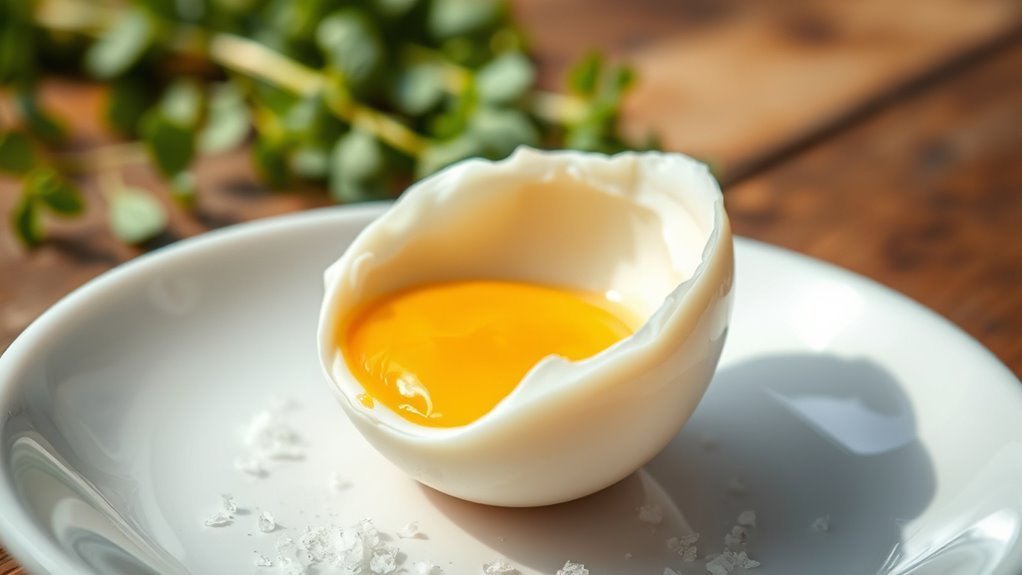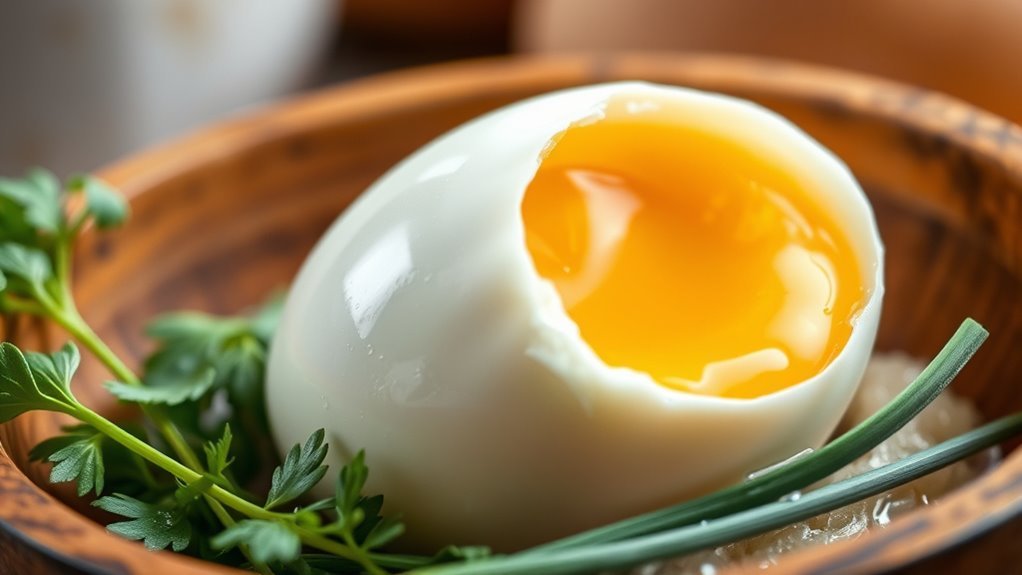Yes, boiled eggs are an excellent choice for a keto diet. With about 1 gram of carbs and 6 grams of high-quality protein per egg, they’re nutrient-dense and low in calories. Eggs are also rich in vitamins and healthy fats, making them great for satiety and energy. You can enjoy 1-3 boiled eggs daily, adjusting based on your dietary needs. There’s more to discover about their benefits and creative ways to include them in your meals.
Nutritional Profile of Boiled Eggs

When it comes to understanding the nutritional profile of boiled eggs, you’ll find they pack a powerful punch. Each boiled egg contains about 6 grams of high-quality protein, providing essential amino acids your body needs. They’re also rich in vitamins like B12 and D, contributing to your overall health. While the yolk contains cholesterol, recent studies suggest that for most people, dietary cholesterol has little effect on cholesterol levels in the blood. In fact, consuming boiled eggs can actually improve your lipid profile. With only about 70 calories and minimal carbs, they’re a great option for anyone seeking freedom in their diet without sacrificing nutrition. Additionally, boiled eggs can be a great addition to a keto-friendly diet, making them an excellent choice for those following low-carb eating plans. So, if you’re looking for a nutrient-dense food, boiled eggs are an excellent choice.
Benefits of Including Boiled Eggs in a Keto Diet

Including boiled eggs in your keto diet can offer significant benefits due to their high protein content and low carbohydrate count. This makes them an excellent choice for maintaining your macronutrient balance while feeling full and satisfied. Additionally, their nutrient-dense profile provides essential vitamins and minerals, making them a smart snack option.
High Protein Content
Boiled eggs are a powerhouse of protein, making them a valuable addition to any keto diet. Their high protein content can support your muscle growth and overall health goals. Including boiled eggs in your meals can offer several benefits:
- Supports muscle growth: The amino acids in eggs are essential for repairing and building muscle tissue.
- Satiety: High protein foods like boiled eggs keep you feeling full longer, curbing cravings and helping with weight management.
- Nutrient-dense: Eggs provide not just protein but also vitamins and minerals that contribute to your overall well-being.
Low Carbohydrate Count
Eggs are incredibly low in carbohydrates, making them an ideal food choice for those following a keto diet. With just about 1 gram of carbs per egg, they fit seamlessly into your low-carb lifestyle. This low carb count allows you to enjoy the numerous egg benefits without derailing your ketosis.
Here’s a quick comparison of some popular foods:
| Food | Carbohydrate Count (per 100g) |
|---|---|
| Boiled Eggs | 1g |
| Spinach | 3.6g |
| Chicken Breast | 0g |
| Almonds | 9.2g |
Including boiled eggs in your meals can enhance satisfaction, provide essential nutrients, and help maintain your energy levels while keeping carbs in check. Enjoy the freedom of delicious low-carb eating!
Nutrient Dense Snack
One of the standout features of boiled eggs is their impressive nutrient density, making them a fantastic snack for anyone on a keto diet. Packed with essential vitamins and minerals, they not only support your health but also keep you feeling satisfied between meals. Here are a few reasons to include them in your snack ideas:
- High Protein Content: Boiled eggs provide a substantial protein boost, vital for muscle repair and satiety.
- Rich in Healthy Fats: The fats in eggs help maintain energy levels and support hormone production.
- Versatile Pairings: You can enjoy them with avocado, leafy greens, or low-carb dips for balanced, healthy pairings. Additionally, incorporating healthy fats from sources like avocado can enhance the nutritional profile of your snack.
How Many Boiled Eggs Can You Eat on Keto?

When following a keto diet, you might wonder how many boiled eggs you can include in your meals. It’s crucial to evaluate daily egg limits based on nutritional benefits and your overall meal planning. Balancing your egg intake can help you meet your dietary goals while enjoying this protein-rich food.
Daily Egg Limit
Determining a daily limit for boiled eggs on a ketogenic diet can be essential for maintaining nutritional balance and adhering to your macro goals. While eggs are a fantastic protein source, it’s important to monitor your egg consumption to guarantee you’re not overdoing it.
Here are some considerations for your daily intake:
- Moderation is key: Aim for 1-3 boiled eggs daily, depending on your overall dietary needs.
- Listen to your body: Pay attention to how your body reacts to egg consumption; some may experience digestive issues with higher intakes.
- Balance with other foods: Incorporate other nutrient-dense foods to maintain variety and meet your macro needs.
Nutritional Benefits
Boiled eggs offer a wealth of nutritional benefits that align well with a ketogenic diet, making them a popular choice for those looking to optimize their intake. Each egg, particularly the egg yolk, is packed with essential vitamins like A, D, and E, along with minerals like selenium and choline. These nutrients support brain health and help regulate metabolism. The high protein content in boiled eggs can keep you satisfied, reducing cravings throughout the day. Additionally, the healthy fats found in the yolk provide sustained energy, vital for those following a low-carb lifestyle. By incorporating boiled eggs into your diet, you can enjoy significant health benefits while maintaining your keto goals with ease.
Meal Planning Tips
While incorporating boiled eggs into your keto meal plan can be beneficial, understanding how many to consume is key for ideal results. Generally, you can enjoy about 2-6 boiled eggs per day, depending on your daily protein needs and overall meal prep strategy. Here are some tips to keep in mind:
- Balance your egg intake with other keto-friendly foods to guarantee variety and nutritional balance.
- Store your boiled eggs properly in the fridge to maintain freshness and make meal prep easier.
- Monitor your body’s response; adjust your egg consumption based on how you feel and your progress on keto.
- Remember that eggs are nutrient-dense and provide essential vitamins and healthy fats, making them a great addition to your diet.
With these guidelines, you can enjoy the freedom of incorporating boiled eggs into your meals while staying within your keto goals.
Delicious Ways to Incorporate Boiled Eggs Into Your Meals
Incorporating boiled eggs into your meals can elevate your culinary experience in numerous ways. You can whip up a classic egg salad for a quick lunch or serve deviled eggs as a delightful appetizer. For breakfast, consider adding boiled eggs to your breakfast bowls, providing a protein-packed start to your day. If you’re seeking snack ideas, try making savory egg muffins or protein bites that are easy to grab on the go. Boiled eggs also make excellent salad toppings, enhancing nutrition without compromising flavor. During meal prep, include them in your lunch ideas to keep your meals satisfying and balanced. With these delicious methods, boiled eggs can transform your everyday dishes into something remarkable.
Comparing Boiled Eggs to Other Protein Sources
Eggs are a popular choice for those seeking to boost their protein intake, but how do they stack up against other protein sources? When making protein comparisons, boiled eggs offer a unique blend of nutrients. Here’s how they measure up against some common egg alternatives:
Boiled eggs provide a unique nutrient profile, making them an excellent protein source compared to other options.
- Chicken Breast: Higher in protein per serving but may lack the healthy fats found in eggs.
- Greek Yogurt: A great source of probiotics, but often contains added sugars that can be counterproductive.
- Tofu: A solid plant-based option, providing protein, but lacks some essential amino acids found in eggs.
Ultimately, boiled eggs stand out for their convenience and nutrient density, making them a versatile addition to your diet. Additionally, their high protein content helps maintain muscle mass during ketosis, further enhancing their appeal as a protein source for those on a keto diet.
Common Myths About Boiled Eggs and the Keto Diet
Although many people embrace boiled eggs as a keto-friendly food, several myths can cloud their nutritional value. One common misconception is that eating eggs raises cholesterol levels considerably, when in fact, research shows that for most people, dietary cholesterol has minimal impact on blood cholesterol. Another keto myth suggests that eggs are too high in protein for a ketogenic diet, but their low carbohydrate content makes them an ideal choice. Additionally, some believe that the way eggs are cooked affects their keto compatibility, which isn’t true; boiled, scrambled, or poached eggs all fit within keto guidelines. By debunking these egg misconceptions, you can confidently enjoy boiled eggs as part of a balanced keto diet that supports your health goals. It’s also important to remember that healthy fats play a crucial role in maintaining energy levels on a ketogenic diet.
Frequently Asked Questions
Can Boiled Eggs Help With Weight Loss on Keto?
Boiled eggs can definitely aid in weight loss on a keto diet. Research shows that high-protein breakfasts, like eggs, can lead to a 30% reduction in cravings throughout the day. Their low carbohydrate content makes them perfect for maintaining ketosis while providing essential nutrients. With about 6 grams of protein per egg, they help you feel full longer, making it easier to stick to your weight loss goals without feeling deprived.
Are Boiled Eggs Suitable for Meal Prep?
Yes, boiled eggs are great for meal prep! Their meal prep benefits include convenience, portability, and long shelf life. You can cook a batch in advance, making it easy to grab a quick snack or add to salads throughout the week. They’re high in protein and healthy fats, fitting well into various diets. Plus, egg cooking is straightforward and doesn’t require much time, giving you more freedom to focus on other meal prep tasks.
Do Boiled Eggs Contain Carbs?
Yes, boiled eggs contain very few carbs—about 0.6 grams per egg. Imagine you’re on a low-carb diet, and you grab a boiled egg for a quick snack. You enjoy the protein without worrying about your carb content. Regarding egg nutrition, they’re packed with healthy fats and essential vitamins, making them a great addition to your diet. So, you can feel free to enjoy boiled eggs without guilt!
Can I Eat Boiled Eggs if Lactose Intolerant?
Yes, you can eat boiled eggs if you’re lactose intolerant. Boiled eggs don’t contain any lactose, making them a safe choice for those with lactose intolerance. They’re rich in protein, vitamins, and healthy fats, offering a nutritious option for your diet. Just remember to check other ingredients if you’re consuming them in dishes that might include dairy. Enjoy the freedom to add boiled eggs to your meals without worry!
How Should Boiled Eggs Be Stored?
You should store boiled eggs in the refrigerator to maintain their freshness. Keep them in a covered container or a resealable bag to prevent odors from other foods affecting their taste. It’s best to consume them within one week for ideal egg freshness. If you want to peel them, do so right before eating, as unpeeled eggs tend to last longer. Always check for any off odors or unusual textures before consuming.
References
- https://en.wikipedia.org/wiki/Ketogenic_diet
- https://www.healthline.com/nutrition/boiled-eggs-keto
- https://www.ncbi.nlm.nih.gov/pmc/articles/PMC6469480/
- https://www.medicalnewstoday.com/articles/323177
- https://www.verywellfit.com/what-is-the-keto-diet-5202753
- https://www.dietdoctor.com/low-carb/keto
- https://www.ncbi.nlm.nih.gov/pmc/articles/PMC6683124/


